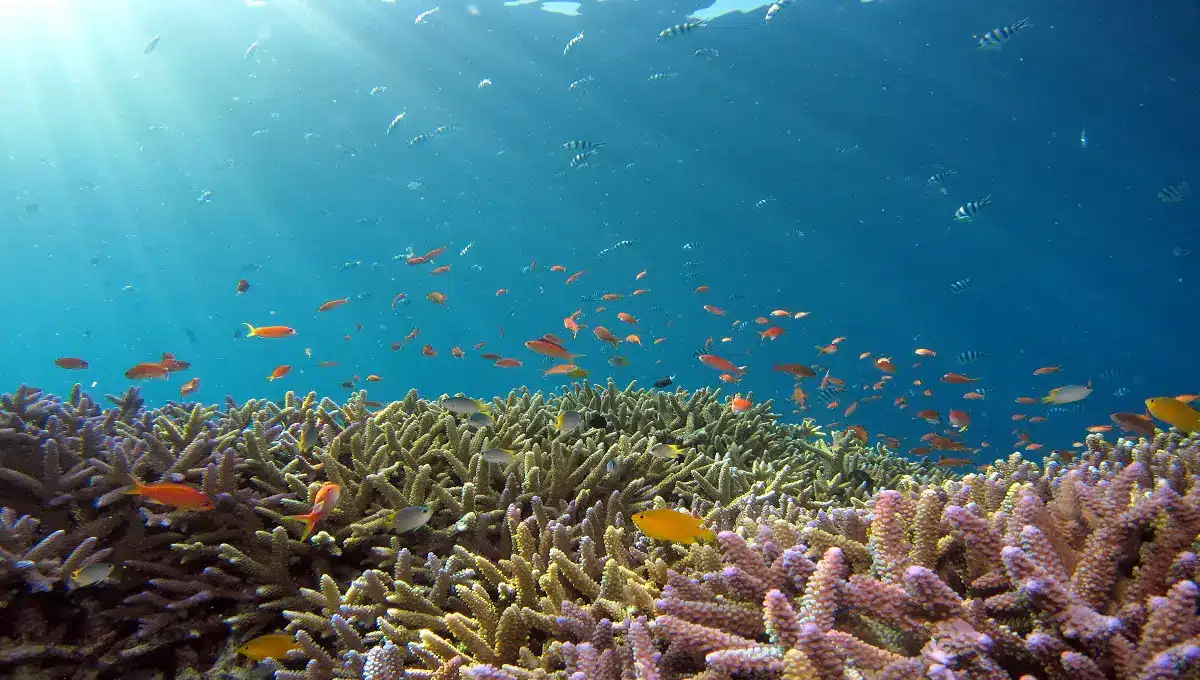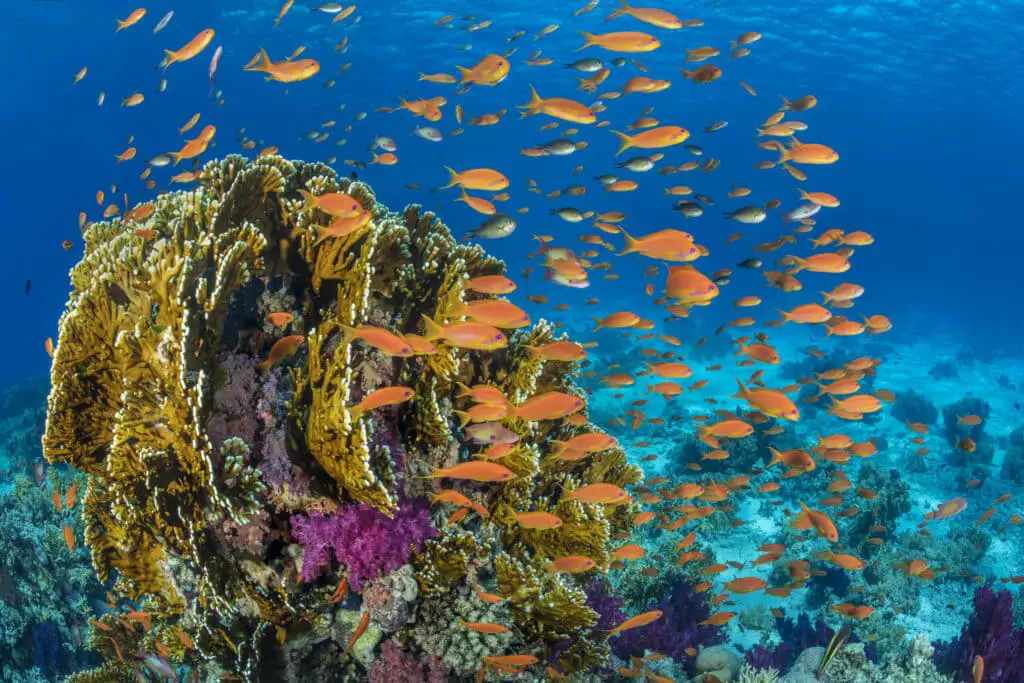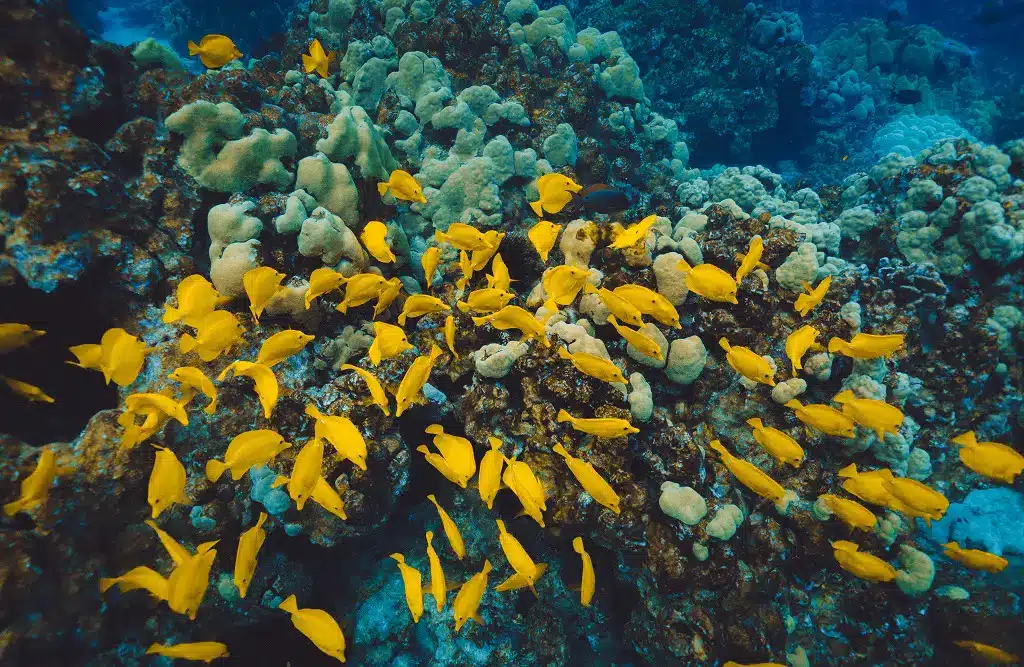Why Are Coral Reefs Overexploited

Introduction
Why Are Coral Reefs Overexploited: Coral reefs, often referred to as the “rainforests of the sea,” are vibrant underwater ecosystems teeming with diverse marine life. These intricate structures, built by tiny coral polyps over centuries, play a crucial role in maintaining marine biodiversity, protecting coastlines, and supporting local economies through tourism and fisheries.
The overexploitation of coral reefs occurs when human activities exert excessive pressure on these delicate ecosystems, depleting their resources and causing long-lasting damage. This multifaceted issue arises from various interconnected factors, including unsustainable fishing practices, the rapid growth of the global tourism industry, and the overarching menace of climate change.
One of the primary drivers of coral reef overexploitation is unsustainable fishing. Overfishing, destructive fishing techniques like blast fishing and cyanide poisoning, and the targeting of valuable and vulnerable species within coral reef ecosystems can all lead to a dramatic decline in fish populations and the degradation of coral habitats.
In addition to overfishing, the tourism industry has boomed in many coastal regions, placing immense stress on nearby coral reefs. The construction of resorts, increased boat traffic, snorkelling, and diving activities can physically damage corals and disrupt their fragile ecosystems.

Why are coral reefs over exploited?
Pollution, overfishing, destructive fishing practices using dynamite or cyanide, collecting live corals for the aquarium market, mining coral for building materials, and a warming climate are some of the many ways that people damage reefs all around the world every day.
Coral reefs, often referred to as the “rainforests of the sea,” are incredibly diverse and valuable ecosystems that play a pivotal role in marine biodiversity and the livelihoods of many coastal communities. However, they are facing a grave and escalating threat: overexploitation.
Coral reef overexploitation is primarily driven by human activities. Unsustainable fishing practices, driven by the high demand for seafood, have led to the depletion of fish stocks within coral reef ecosystems. Overfishing, destructive methods such as dynamite and cyanide fishing, and the targeting of valuable species can cause irreparable damage to these delicate ecosystems.
Tourism also contributes significantly to coral reef overexploitation. The rapid growth of the global tourism industry has resulted in increased coastal development, boat traffic, and recreational activities like snorkeling and diving. These activities can lead to physical damage to corals, disrupt their fragile balance, and contribute to reef degradation.
Coral reef overexploitation is a dire consequence of unsustainable human activities, including fishing and tourism, compounded by the overarching issue of climate change. It imperils the health of these vital ecosystems, their rich biodiversity, and the numerous benefits they provide to both marine life and human communities.
How are coral reefs being exploited?
Blast fishing (i.e., using explosives to kill fish) can cause physical damage to corals as well. Coral harvesting for the aquarium trade, jewelry, and curios can lead to over-harvesting of specific species, destruction of reef habitat, and reduced biodiversity.
Coral reefs, the diverse and vibrant marine ecosystems, are being exploited in several ways, primarily due to human activities that threaten their health and sustainability.
- Overfishing: One of the most significant threats to coral reefs is overfishing. Unsustainable fishing practices, driven by the demand for seafood, result in the depletion of key fish species that are vital to the balance of the reef ecosystem.
- Destructive Fishing Techniques: Some fishing methods, such as blast fishing and cyanide poisoning, cause immediate and extensive damage to coral reefs. These destructive techniques kill not only the target fish but also harm the corals and other marine life in the vicinity.
- Unregulated Tourism: The tourism industry, while providing economic benefits to coastal communities, can exploit coral reefs through unregulated activities. Frequent snorkeling, diving, and boating in sensitive reef areas can lead to physical damage, such as trampling of corals and anchoring on them, disrupting their growth and reproduction.
- Climate Change: Coral reefs are highly vulnerable to the effects of climate change. Rising sea temperatures cause coral bleaching events, where the corals expel their symbiotic algae, leading to their death.
- Pollution: Runoff from agriculture, coastal development, and pollution from sewage and industry introduce toxins and excess nutrients into reef waters, leading to coral disease outbreaks and algal overgrowth.
Coral reefs are being exploited through a combination of overfishing, destructive fishing practices, unregulated tourism, climate change impacts, and pollution. To preserve these invaluable ecosystems, concerted global efforts are needed to address these challenges and promote sustainable practices for the benefit of marine life and future generations.
Why are coral reefs increasingly at risk of extinction?
Coral reefs can be damaged by natural processes, such as storms, but they are increasingly at risk from human activities. Oil spills and pollutants can threaten entire reefs. Excessive nutrients from land sources, such as sewage and agricultural fertilizers, promote the growth of algae that can smother corals.
Coral reefs, the vibrant and diverse underwater ecosystems that dot our planet’s oceans, are facing an escalating risk of extinction due to a complex interplay of multiple stressors and human activities.
- Climate Change: Rising sea temperatures due to climate change pose a severe threat to coral reefs. Increased temperatures lead to coral bleaching events, during which corals expel the symbiotic algae that provide them with nutrients and color. Without these algae, corals lose their main food source and become more susceptible to disease and death.
- Ocean Acidification: The absorption of excess atmospheric carbon dioxide by the oceans leads to ocean acidification. This disrupts the process of calcification, which is essential for corals to build their calcium carbonate skeletons. Weakened and eroded coral structures are more vulnerable to physical damage.
- Pollution: Runoff from coastal development, agriculture, and industry introduces pollutants and excess nutrients into reef ecosystems. This pollution fuels algal overgrowth, which can smother corals and disrupt their fragile balance.
- Overfishing: Unsustainable fishing practices, driven by the global demand for seafood, deplete fish populations within coral reef ecosystems. The loss of key herbivorous fish disrupts the natural ecosystem dynamics, allowing algae to overgrow corals.
- Destructive Fishing Techniques: Some fishing methods, such as blast fishing and cyanide poisoning, directly harm corals and marine life in reef areas.
Are coral reefs in danger of extinction?
60% can disappear in the next 30 years
The continuously growing human population and global warming is threatening our coral reefs – where 25% of marine animals live and where 90% of them rely on for one reason or another. The whole marine ecosystem is being threatened by the loss of our reefs.
Coral reefs, often referred to as the “rainforests of the sea,” are indeed in grave danger of extinction. These underwater ecosystems, composed of delicate coral polyps, face a multitude of threats that collectively jeopardize their survival.
One of the primary culprits behind the endangerment of coral reefs is climate change. Rising sea temperatures, a consequence of global warming, lead to a phenomenon known as coral bleaching. When corals expel the symbiotic algae that provide them with nutrients and vibrant colors, they become vulnerable and can die. Additionally, the increasing acidity of oceans due to higher carbon dioxide levels makes it harder for corals to build their calcium carbonate skeletons, which further weakens them.
Human activities such as overfishing, destructive fishing practices, and pollution also harm coral reefs. Coastal development and sediment runoff smother corals, while nutrient pollution encourages the growth of harmful algae that can outcompete corals for space.
Efforts are being made worldwide to mitigate these threats, including marine protected areas, coral restoration projects, and carbon emission reductions. However, the situation remains dire, and urgent action is necessary to ensure the long-term survival of these vital ecosystems that support marine biodiversity, protect coastlines, and sustain millions of livelihoods.
What is the reason coral reefs are among the most productive?
Figure 2 – Corals reefs are full of life because they very efficiently recycle the small amount of food and nutrients available in the tropical ocean. (A) Corals and the algae living inside the corals help each other. The algae produce sugar, which the corals eat.
They thrive in nutrient-rich, shallow, and sunlit tropical waters, providing an ideal environment for diverse marine life to flourish. The symbiotic relationship between corals and tiny photosynthetic algae known as zooxanthellae is pivotal. These algae live within the coral’s tissues and convert sunlight into energy through photosynthesis, providing a substantial portion of the coral’s nutritional needs.
This complex architecture creates a highly diverse and densely populated habitat, fostering a rich biodiversity. The nooks and crannies of the reef provide shelter for various fish species, while the coral itself serves as a nursery for countless marine organisms, including fish, crustaceans, and mollusks.
The constant competition for space and resources in the reef ecosystem drives a remarkable level of specialization among its inhabitants. This results in a finely tuned ecological balance where each species plays a crucial role in the overall health and productivity of the reef.
Why are coral reefs suffering because of climate change?
Climate change leads to: A warming ocean: causes thermal stress that contributes to coral bleaching and infectious disease. Sea level rise: may lead to increases in sedimentation for reefs located near land-based sources of sediment. Sedimentation runoff can lead to the smothering of coral.
Coral reefs are suffering profoundly due to the impacts of climate change. Rising global temperatures are a primary factor, leading to a phenomenon known as coral bleaching. When sea temperatures become too high, corals expel the vital algae (zooxanthellae) living within their tissues, causing them to turn white and leaving them vulnerable to disease and starvation. Prolonged or severe bleaching events can result in mass coral mortality.
Ocean acidification, a consequence of increased carbon dioxide levels in the atmosphere, hampers the ability of corals to build their calcium carbonate skeletons. This weakens their structural integrity, making them more susceptible to damage from storms and waves.
Rising sea levels exacerbate the problem by reducing the amount of light that reaches the corals, hindering their growth and recovery. Additionally, increased storm intensity associated with climate change can physically break apart fragile coral structures.
Moreover, climate change disrupts the delicate balance of reef ecosystems, affecting the myriad of species that rely on them for food, shelter, and reproduction. This has a cascading effect on entire marine food webs.
What will happen if coral reefs will be destroyed?
For these creatures, the reef provides essential food, shelter and the spawning grounds needed for their species’ survival. If their homes disappeared, marine biodiversity would suffer immensely. And, like a domino effect, many fish, turtles and other creatures would disappear.
If coral reefs continue to be destroyed at the current alarming rate, it will have devastating consequences for both marine and human life. Firstly, the loss of coral reefs means a catastrophic decline in biodiversity. These ecosystems are home to an incredible array of marine species, with estimates suggesting they support up to a quarter of all known marine species. Without the reefs, many of these species would face extinction.
Secondly, millions of people around the world depend on coral reefs for their livelihoods. Coastal communities rely on them for fisheries, tourism, and coastal protection. The decline of reefs would jeopardize the income and food security of these communities, potentially leading to poverty and social instability.
Moreover, coral reefs serve as natural barriers that protect coastlines from erosion and storm damage. Without them, coastal areas would be more vulnerable to the destructive impacts of hurricanes, typhoons, and rising sea levels.
Reefs are critical for global carbon cycling and contribute to the regulation of the Earth’s climate. Their destruction could further exacerbate climate change by disrupting these vital processes.
The destruction of coral reefs would have far-reaching and profound consequences, affecting both marine ecosystems and human societies around the world. Preserving and restoring these invaluable ecosystems is imperative for the health of our planet and future generations.
How can we help prevent the overexploitation of coral reefs?
Preventing the overexploitation of coral reefs requires a combination of local, national, and international efforts aimed at sustainable management and conservation.
Firstly, implementing and enforcing marine protected areas (MPAs) is crucial. These designated zones restrict activities like fishing, tourism, and development, allowing reefs to regenerate and thrive. Properly managed MPAs can act as sanctuaries for marine life and serve as a source of new organisms to replenish surrounding areas.
Promoting sustainable fishing practices is another key strategy. This includes enforcing catch limits, using selective gear that minimizes bycatch, and avoiding destructive practices like dynamite or cyanide fishing. Supporting and incentivizing responsible fishing practices ensures that reef ecosystems can continue to provide a livelihood for coastal communities without causing irreparable harm.
Public awareness and education campaigns play a vital role in preventing overexploitation. By informing communities, tourists, and stakeholders about the value and vulnerability of coral reefs, we can foster a culture of conservation and responsible tourism.
Additionally, engaging local communities in the decision-making process is essential. When communities have a stake in the management of their marine resources, they are more likely to adopt sustainable practices and become stewards of their own environment.
Internationally, collaborative efforts to combat climate change are imperative, as rising temperatures and ocean acidification are major threats to coral reefs. By reducing carbon emissions, we can help mitigate the impacts of climate change and give reefs a better chance at survival.

Conclusion
The overexploitation of coral reefs is a complex and multifaceted issue driven by a combination of unsustainable fishing practices, tourism development, and the overarching challenge of climate change. Coral reefs, essential for both marine biodiversity and coastal protection, are under severe threat due to human activities. As we conclude our exploration of why coral reefs are overexploited, several key takeaways emerge.
Firstly, addressing overfishing through sustainable management practices is critical. Implementing regulations that limit catch quotas, protect vulnerable species, and promote responsible fishing techniques can help restore fish populations and reduce the pressure on coral reefs.
Secondly, managing tourism around coral reefs is essential. Striking a balance between economic benefits and ecological preservation is possible through careful planning, enforcing responsible tourism practices, and educating visitors about reef conservation.
The overexploitation of coral reefs is a global challenge that requires concerted efforts from governments, industries, and communities. By implementing sustainable fishing practices, responsible tourism, and aggressive climate action, we can work towards safeguarding these invaluable ecosystems for future generations. The continued survival of coral reefs depends on our collective commitment to their preservation and the broader health of our planet’s oceans.



